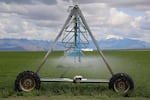Update: Ivan Gall was confirmed by the Senate on Friday, May 31, in a party-line vote. Republicans opposing his confirmation to lead the Oregon Department of Water Resources, and majority Democrats approving the governor’s nominee.
Oregon lawmakers and water users will be keeping a close eye on the man who could soon lead the agency in charge of water rights, farm irrigation rules and oversight of drinking water wells.
Oregon senators are expected to vote Friday to confirm Gov. Tina Kotek’s pick to lead the Oregon Water Resources Department, Ivan Gall, following a process that rallied ardent opposition from some GOP senators and tepid reactions from key Democrats.
Those sentiments were on display Wednesday at a hearing in Salem, when senators on both sides of the political aisle scrutinized Gall’s qualifications and ability to lead the agency.
“There are real concerns about the fact that you come from inside and have been perceived as being part of the problem and not part of the solution,” Sen. Elizabeth Steiner, D-Portland, said. “We’re going to be watching because we care very very deeply about ensuring that — in a state where the expression goes ‘whiskey’s for drinking and water’s for fighting’ — that we have a state system that actually minimizes the fighting.”
When asked what his top three priorities are for his first 100 days at the agency, Gall said he’ll spend a significant amount of time talking to water users across the state and seeking feedback.
He added that a long-term goal would be to eventually update the agency’s rules and statutes to modernize Oregon’s water law.
“Nimble and adaptive water management is needed due to increase in demand, sustained drought conditions and increased water scarcity made worse by climate change,” Gall said. “Water has changed in Oregon. What has worked in the past is no longer working for us. We will need collaboration, common sense and compromise for us to succeed.”

An irrigation pivot in Harney County on May 27, 2019. Spraying water at a lower height, so that less evaporates, is one conservation measure some farmers implemented in response to depleting groundwater levels.
Emily Cureton/OPB
Earlier this month, Kotek announced Gall as her choice to lead the Oregon Water Resources Department, or OWRD, after she previously passed over the longtime agency insider’s application during a nearly yearlong candidate search.
Gall’s nomination has stoked political pushback from some Republican senators while also unifying support from water conservation groups. Both sides do share a common ground — all say the director’s job is critical at a time when leaders look to change how the state manages water so that there’s enough to go around in the future.
It’s unlikely the minority Republican Party’s opposition to Gall will sway the final Senate vote. That opposition does mean the state’s next water resources director is poised to begin his tenure on a political tightrope, though, while his agency is in the middle of drafting the most significant groundwater policy changes Oregon has seen in decades.

Ivan Gall has been with the Oregon Water Resources Department for more than 25 years.
Courtesy of the Oregon Water Resources Department
On May 24, 10 GOP senators put pressure on Kotek to outright withdraw the nomination in a letter stating they have “significant reservations” about Gall, who is currently OWRD’s interim deputy director. The senators are openly opposed to Gall’s nomination, while some Democratic senators either did not respond to requests for comment, or declined to speak on the record.
“Mr. Gall is an inexperienced leader that will likely perpetuate the status quo of a paralyzed inefficient agency that routinely misses its own performance measures and fails to meet its core mission of co-equally managing water for out-of-stream and in-stream uses,” reads the Republican senators’ letter.
Gall, who declined to be interviewed in advance of his confirmation, has worked at the state water agency for more than 25 years. His nomination comes as OWRD is in the midst of drafting major changes to the state’s groundwater policy, getting support from environmental groups, and opposition from some agricultural interests and Central Oregon city leaders.
The Republicans’ letter to Kotek criticizes Gall’s support for those proposed groundwater changes, which would lead to statewide restrictions on new wells in areas where aquifers are dropping. The senators wrote Gall “seems unwilling to explore alternative approaches.”
But in an interview, Sen. Lynn Findley, R-Vale, said his opposition to Gall isn’t tied to specific policies, but rather the department’s overall track record.
“Could he hit the ground running? Absolutely. But, the problem is the agency desperately needs to redirect itself and fix itself and I don’t think he’s the guy to do that,” Findley said.
The governor’s office did not respond to requests for comment on the senators’ objections.
Mixed feelings about the governor’s pick
Some of the state’s most high profile conservation groups have coalesced around supporting both the groundwater rule changes and Gall’s leadership, including WaterWatch, Trout Unlimited, Environmental Defense Fund and the Nature Conservancy.
“The opposition is not really about Mr. Gall, it is about opposing the direction the state is moving towards on sustainable water management,” said Kimberley Priestley, a senior policy analyst for WaterWatch.
Priestley tied the pushback to Gall’s nomination to the Oregon Farm Bureau, a powerful lobbying group representing agricultural interests in the state. An estimated 85% of all the water diverted from rivers, streams and aquifers in Oregon is used for irrigated agriculture.
Oregon Farm Bureau Vice President of Government and Legal Affairs Lauren Poor said in an email to OPB that the organization does not have an official position on Gall’s nomination, but that it was hoping for someone with a fresh perspective from outside the organization.
“We are very concerned that despite Mr. Gall’s long and capable service, that his appointment represents more status quo,” Poor said. “We are eager to hear what steps Mr. Gall will take to restore our members’ confidence in the Department.”
Water policy concerns keep lawmakers focused on budgets
In an unusual move, two influential House leaders for water policy reluctantly supported Kotek’s nomination by couching their support for Gall in a list of demands.
On May 24, Rep. Mark Owens, R-Crane, and Rep. Ken Helm, D-Beaverton, penned a letter of “qualified support,” for Gall weeks after Kotek chose him to lead the agency.
“We had hoped that an outside candidate would be picked because a fresh start in a fresh direction is desired,” Helm said in an interview. “But, the department’s sort of been in limbo since Byler [the former director] left, and that’s just not healthy to continue.”
The bipartisan duo previously worked together in 2021 to send about $500 million in state funding to water projects and the Oregon Water Resources Department
Helm said his recent joint letter with Owens gets their policy goals for the 2025 long legislative session on the record.
That letter also outlines 10 specific asks of the new water resources director — things like regular performance reviews of agency leaders, “a near-term strategy to publicly communicate whether there is surface water and/or groundwater available for appropriation in each of the basins across the state,” and progress reports on how the department meets those goals.
“We expect to see quantifiable progress within the next 12-18 months,” the letter reads.
Once appointed by the state Senate, the state water director can only be dismissed by the governor, so lawmakers won’t have further say over who holds the job if Gall is approved as expected Friday.
“There is no enforcement mechanism per se,” Owens said in an interview. “It’s political pressure, it’s goodwill, and it’s whether that can continue to be extended.”